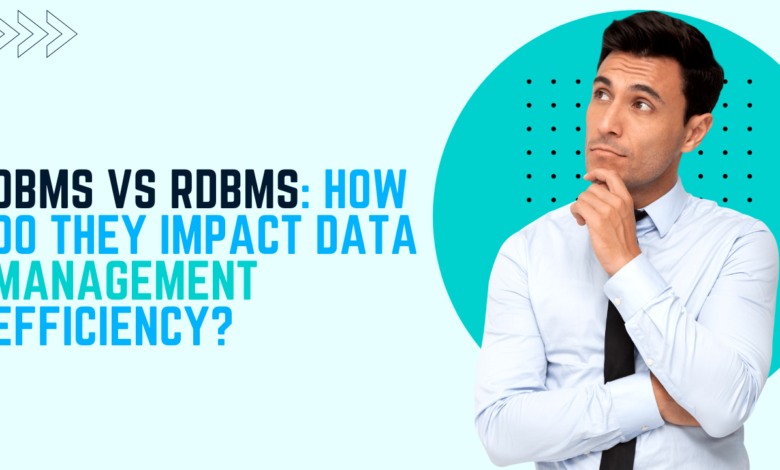DBMS vs RDBMS: How Do They Impact Data Management Efficiency?

In today’s data-driven world, understanding how data is managed is crucial for businesses and developers alike. Two common systems used for data management are DBMS (Database Management System) and RDBMS (Relational Database Management System). While they might seem similar at first glance, the difference between DBMS and RDBMS can significantly impact data management efficiency. If you’re curious about these systems and how they operate, check out this comprehensive guide on the difference between dbms and rdbms.
In this article, we will explore the fundamental characteristics of DBMS and RDBMS, their advantages and disadvantages, and how each impacts data management efficiency. By the end, you’ll have a clearer understanding of which system might be best suited for your needs.
Understanding DBMS
What is a DBMS?
A Database Management System (DBMS) is software that allows users to create, retrieve, update, and manage data in databases. DBMS is generally designed for smaller applications and can handle various types of data structures, such as hierarchical, network, or flat file models.
Key Features of DBMS
- Data Storage: DBMS provides a mechanism to store data in files, making it relatively easy to manage.
- Data Manipulation: Users can perform operations like adding, deleting, and updating records.
- Data Security: Although security is basic, it ensures that unauthorized users cannot access sensitive data.
- Data Backup and Recovery: DBMS typically includes basic backup and recovery options.
Understanding RDBMS
What is an RDBMS?
A Relational Database Management System (RDBMS) is a type of DBMS that organizes data into tables. The relational model allows for more complex queries and relationships between data. RDBMS uses Structured Query Language (SQL) for data manipulation and is ideal for applications requiring robust data integrity.
Key Features of RDBMS
- Structured Data: Data is stored in tables with predefined relationships, making it easier to manage complex data structures.
- ACID Properties: RDBMS ensures Atomicity, Consistency, Isolation, and Durability, providing a high level of data integrity.
- Data Integrity: RDBMS supports constraints like primary keys and foreign keys, ensuring data consistency.
- Advanced Query Capabilities: Users can execute complex queries to retrieve and manipulate data efficiently.
Comparative Analysis: DBMS vs RDBMS
To understand how DBMS and RDBMS impact data management efficiency, let’s delve deeper into their differences across various dimensions.
Data Structure
One of the most significant differences between DBMS and RDBMS is how data is structured.
- DBMS typically stores data as files without any fixed structure, which can lead to redundancy and inconsistency.
- RDBMS, on the other hand, organizes data into tables with defined relationships, promoting data integrity and reducing redundancy.
Data Integrity and Security
Data integrity is paramount in any data management system.
- In DBMS, there are limited mechanisms for enforcing data integrity, which can lead to inconsistencies.
- RDBMS employs stringent integrity constraints and security measures, making it a more reliable option for mission-critical applications.
Relationships and Joins
When it comes to handling relationships:
- DBMS often struggles with complex relationships between data entities, as it lacks the relational model.
- RDBMS excels in this area, allowing users to perform various types of joins, making it easier to query related data.
Scalability and Performance
Performance and scalability are vital for growing applications.
- DBMS may become inefficient with large datasets as it does not optimize data retrieval.
- RDBMS is designed for scalability, ensuring efficient performance even with extensive data operations.
Advantages and Disadvantages
DBMS: Pros and Cons
Advantages
- Simplicity: Easier to use for small-scale applications.
- Cost-Effective: Often less expensive than RDBMS solutions.
- Flexibility: Supports various data structures.
Disadvantages
- Limited Data Integrity: Prone to redundancy and inconsistency.
- Scalability Issues: Not ideal for larger datasets.
- Basic Security: Lacks robust security features.
RDBMS: Pros and Cons
Advantages
- Data Integrity: Strong integrity constraints reduce data anomalies.
- Advanced Querying: Supports complex queries and joins.
- High Performance: Efficient handling of large volumes of data.
Disadvantages
- Complexity: Requires more expertise to set up and manage.
- Cost: Often more expensive than traditional DBMS.
- Overhead: May have performance overhead in small applications.
Impact on Data Management Efficiency
Understanding the difference between DBMS and RDBMS is crucial for assessing their impact on data management efficiency.
DBMS and Data Management Efficiency
For small-scale applications where the data is relatively simple, a DBMS may offer sufficient performance and ease of use. However, as data volumes grow and complexity increases, the efficiency of DBMS may decline significantly. Redundant data and lack of robust integrity constraints can lead to errors and increased maintenance costs.
RDBMS and Data Management Efficiency
Conversely, an RDBMS excels in environments requiring high data integrity, complex queries, and large datasets. The structured nature of RDBMS allows for optimized data retrieval and storage, which translates to better overall performance. The implementation of ACID properties ensures that transactions are processed reliably, which is essential for applications like banking and e-commerce.
Real-World Applications
When to Use DBMS
- Small Businesses: Ideal for startups with simple data requirements.
- Low Complexity Projects: Suitable for applications that do not require complex relationships.
- Cost-Sensitive Projects: When budget constraints are a significant factor.
When to Use RDBMS
- Large Enterprises: Essential for organizations with complex data needs.
- Critical Applications: Best for systems where data integrity and security are paramount.
- High-Volume Transactions: Ideal for applications with frequent data transactions, like e-commerce platforms.
Future Trends in Data Management
As technology continues to evolve, so too will the landscape of data management. The emergence of NoSQL databases presents a new alternative, challenging the traditional dominance of RDBMS in certain applications. However, the structured and integrity-focused nature of RDBMS ensures it will remain relevant for many enterprise applications.
Conclusion
In summary, the difference between DBMS and RDBMS is significant when considering data management efficiency. DBMS might be ideal for simpler applications, but as complexity and data integrity requirements grow, RDBMS shines. Understanding these systems will enable you to make informed choices that enhance your data management strategies, ensuring better efficiency and reliability in your operations. Whether you’re a business owner, developer, or IT manager, choosing the right system can make all the difference in how effectively you manage your data.
FAQ:
1. What is the main difference between DBMS and RDBMS?
The primary difference is that DBMS does not enforce a strict structure for data, while RDBMS organizes data into tables and enforces integrity constraints.
2. Can I use DBMS for large-scale applications?
DBMS may not be suitable for large-scale applications due to its limited capabilities in managing complex data relationships and integrity.
3. What types of queries can I perform in RDBMS?
RDBMS allows for complex queries, including various types of joins, aggregations, and subqueries, enabling advanced data manipulation.
4. Is DBMS less secure than RDBMS?
Yes, DBMS typically offers basic security features, whereas RDBMS has more robust mechanisms for ensuring data security and integrity.
5. When should I choose RDBMS over DBMS?
Opt for RDBMS when dealing with complex data relationships, requiring high data integrity, or operating within an enterprise environment with substantial data needs.





